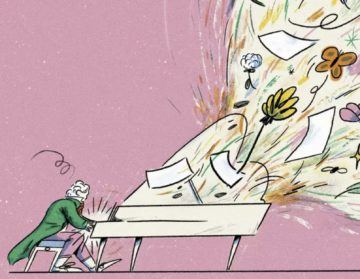David P. Goldman in Tablet:
 On Christmas Day 1989 after the fall of the Berlin Wall, Leonard Bernstein conducted Beethoven’s Ninth Symphony, with its setting of Friedrich Schiller’s Ode to Joy:
On Christmas Day 1989 after the fall of the Berlin Wall, Leonard Bernstein conducted Beethoven’s Ninth Symphony, with its setting of Friedrich Schiller’s Ode to Joy:
Joy, immortal incandescence!
Daughter of Elysium!
Drunk with fire from thy presence
To thy temple ground we come …
“Freude”—Joy—is the subject of Schiller’s ode, but Bernstein substituted the word “Freiheit”—Freedom—in his festive rendering of the work. That fit the occasion, but it also paid tribute to Beethoven himself, lauded as the composer of freedom by writers too numerous to mention.
There are rare moments when the triumph of the human spirit lifts us into a higher state of being. We look at perfect strangers and see the better angels of our nature, and shed the pettiness and petulance of daily life. We feel the touch of the infinite and feel the fullness of our freedom, because man is only free as a moral agent. And in such moments we hearken to the composer of freedom, whose 250th birthday falls this Dec. 16. People of good will everywhere will celebrate this anniversary with gratitude. I owe a personal debt to Beethoven, the guide and comfort of my youth, and in his honor I offer a thought about his music: It isn’t only that Beethoven was an apostle, or an exemplar of freedom, but that his music actually summons us to freedom.
More here.
